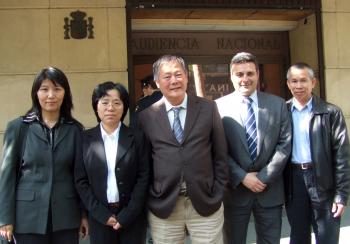In a groundbreaking case, following a two-year investigation, a Spanish judge has accepted charges of genocide and torture in a case filed against five high-ranking CCP officials for their role in the persecution of Falun Gong.
This is the first time a court has proceeded to indictment on a criminal charge against former communist leader Jiang Zemin. If Jiang and the other defendants were in Spain, the Court could call them before the Judge for a hearing.
“This historic decision by a Spanish judge means that Chinese Communist Party leaders responsible for brutal crimes are now one step closer to being brought to justice,” said Carlos Iglesias, a local lawyer from the Human Rights Law Foundation, representing the plaintiffs.
Between 2003 and 2007 fifteen victims of persecution filed criminal complaints against each of the five officials under a Spanish law that enables individuals or their lawyers to initiate private prosecutions (acciones populares). Four complaints were combined into one case, the facts of which a judge from Spain’s National Court (Audiencia Nacional) has been investigating since 2006; the fifth was added later.
On Nov. 11, Iglesias received a letter from the National Court saying the charges of genocide and torture had been accepted.
Among the accused is ex-leader of the Chinese Communist Party, Jiang Zemin. Jiang is widely acknowledged as the initiator and primary driver behind the campaign launched in 1999 to “eradicate” Falun Gong. According to Chinese regime statistics at the time, an estimated 70 to 100 million people were practicing the discipline that combines slow-moving exercises and spiritual teachings.
In order to implement Jiang’s decision to wipe out the group, the country’s state-run media, security apparatus, and network of “re-education through labor camps” were mobilized in full force. Since then, experts estimate that hundred of thousands, possibly millions, of practitioners have been sent to labor camps, prisons, and thought reform classes.
Human rights groups and Western media reports have documented the systematic use of torture to force them to renounce their faith. According to the Falun Dafa Information Center, over 3,000 are documented to have been killed, many due to torture, since 1999.







